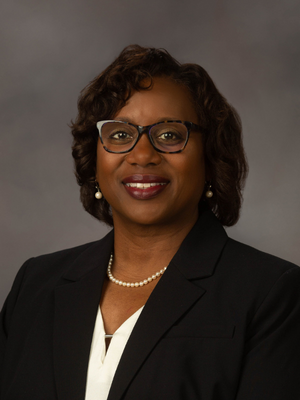Educator Loretta Jackson-Williams, MD/PhD, Delivers Second Annual Rebecca Lee Crumpler Alumni Lecture

The Second Annual Rebecca Lee Crumpler Alumni Lecture honored the pioneering Black physician with an online lecture by Loretta Jackson-Williams, MD’94, PhD’94, FACEP, vice dean for medical education and professor of emergency medicine at the University of Mississippi School of Medicine.
“As we honor Rebecca Lee Crumpler, I’m reminded that we all stand on the shoulders of someone,” said Jackson-Williams. She credited the support of professors, physicians, classmates and family, as well as BU and the University of Mississippi with helping her throughout her career.
The March 6 event was , sponsored by the Chobanian & Avedisian School of Medicine Diversity & Inclusion Office and moderated by Kaye-Alese Green, a third-year MD-JD student and the school’s inaugural diversity fellow.
“She (Jackson-Williams) comes from a legacy of educators and is deeply an educator at heart,” said Green. Like Crumpler, Jackson-Williams is a trailblazer as the first Black administrator at the University of Mississippi School of Medicine.
BUMC Provost and Dean Karen Antman, MD, noted that the Rebecca Lee Crumpler, MD, Endowed Scholarship Fund had surpassed its original goal of $100,000 and was now nearly triple that amount at approximately $284,000.
When Crumpler graduated in 1864 from the New England Female Medical College (NEFMC) – the precursor of BU’s medical school – she was the first Black woman in the U.S. to do so. Despite her skill as a physician and her desire to heal others, her life wasn’t easy. She never had hospital admitting privileges, pharmacists refused to fill her prescriptions and the male medical establishment of her day turned their backs on her and other women physicians.
Jackson-Williams was born in Mississippi in 1965 and came to medical school at BU from Tougaloo College in Jackson, Mississippi. She was the first from her school to participate in BU’s Early Medical School Selection Program that helps students from Historically Black Colleges and Universities, as well as colleges and universities with large Latinx and Pacific Island student populations, transition into medical school and remain there.
“I was surrounded in the (EMSSP) program with other students from around the country that had similar experiences to me,” said Jackson-Williams. But the greater student body had limited insight into their lives, she added.
In her hometown of Indianola, Mississippi, the railroad tracks literally separated the Black and white sections of town. Jackson-Williams lived in a multigenerational household led by two college-educated parents who pushed their four children to succeed, and believed education was the key to upward mobility.
Her parents were protective, and in medical school Jackson-Williams discovered how sheltered she and her siblings were.
“In Boston I learned that, not only was I a minority as a Black female…but I was socioeconomically disadvantaged,” said Jackson-Williams. “Those were not words in my vocabulary prior to that.”
Still, getting to know medical students outside those in EMSSP “was one of the most eye-opening experiences for me,” said Jackson-Williams. “I wouldn’t trade it for anything.”
Jackson-Williams said she advises her students at the University of Mississippi to find at least one friend in medical school to share the highs and buffer the lows.
“These are lifelong relationships, people you will rely on for decades to come,” she said.
Jackson-Williams completed her residency in Oakland, California, returning home to Mississippi with her husband and child. Living in Boston and California, she realized that racism was a national problem. Despite her home state’s long and troubled racial past, she saw possibilities for change.
“I was given a lot of opportunities at the school (University of Mississippi) and within the state,” she said, that helped her to affect changes in the curriculum and address critical problems like the lack of primary care physicians in a state ranked at or near the bottom in physicians per capita. The need was greatest in rural areas and in Mississippi over 80% of counties are considered rural, all the counties are considered at least partially medically underserved and 50% of patients live in rural areas.
In 2007, the state enacted a rural physician scholarship program to subsidize education for medical students from rural areas who committed to working in underserved areas. In 2020, Williams managed a Health Resources Services Administration grant that helped the school focus developing primary care physicians for rural areas.
Jackson-Williams said that 75% of the students graduating from the six schools comprising graduate medical education now remain working in Mississippi, one of the highest rates of retention in the country.
“People with the right skill set will always be our most limited resource,” she said.
The lesson she imparts to students gleaned from a career in emergency medicine, where you don’t always have the gratification of seeing someone return to health, is to look inside yourself for validation.
“What you do is to decide that you’ve given your best,” said Jackson-Williams. “Because if you’re always looking for external validation, you won’t always get it. That’s hard when you’re starting out because we live in a society that values external validation.”